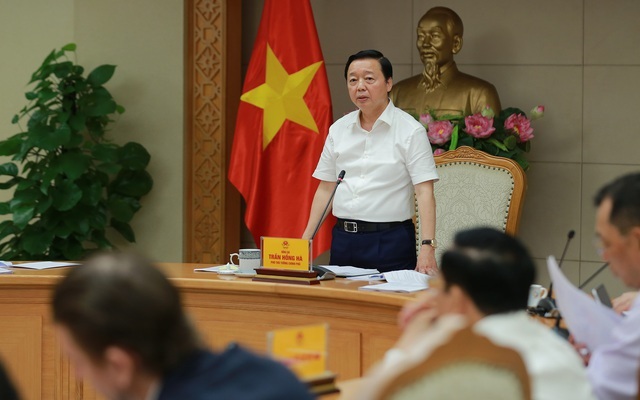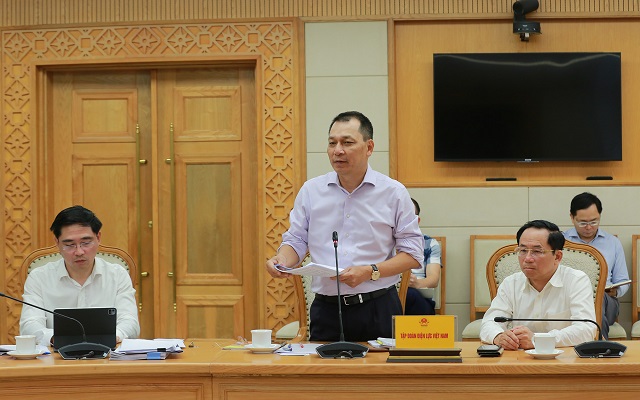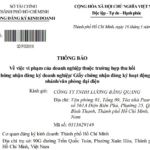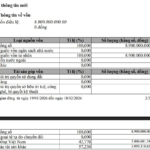At a meeting chaired by Deputy Prime Minister Tran Hong Ha on the draft decree regulating the direct power purchase agreement (DPPA) mechanism, Mr. Dang Hoang An, Chairman of the Board of Members of Vietnam Electricity (EVN), expressed his opinion.

Deputy Prime Minister Tran Hong Ha stated that the direct power purchase mechanism is outlined in the Law on Electricity and serves as the foundation for developing a competitive electricity market. Photo: VGP/Minh Khoi
|
Speaking at the meeting, the Deputy Prime Minister stated that the Party and State have issued numerous major policies and orientations in the fields of energy and electricity, but implementation has been slow, including the orientation to develop a competitive electricity market. One of the reasons is the lack of a synchronized legal framework and the specificity of the organizational model and implementation conditions.
Over the years, state-owned corporations and enterprises have played a leading role in ensuring a balanced energy supply for socio-economic development. However, other economic components also face significant challenges in participating.
The direct power purchase mechanism is stipulated in the Law on Electricity and serves as the foundation for developing a competitive electricity market. Accordingly, state management is separated from electricity production, business, transmission, and distribution activities.
The state will only hold and invest in areas that ensure national energy security, while enterprises will compete on an equal footing, regardless of whether they are state-owned or private,” said the Deputy Prime Minister, emphasizing the need for a specific and feasible roadmap for electricity development policies in general and the direct power purchase mechanism in particular.
The Deputy Prime Minister stated that the decree should clarify the subjects participating in direct power purchases; the rights, responsibilities, and obligations of the parties involved in direct power purchases regarding economic interests and ensuring grid safety; policies to prioritize and encourage enterprises to consume green and renewable energy to receive green credits; and so on.
According to Mr. Nguyen Sinh Nhat Tan, Deputy Minister of Industry and Trade, the draft decree regulates direct power purchases through dedicated lines and the national grid; the order of implementation and the responsibilities of the relevant units. The perspective in building this decree is to ensure feasibility and immediate implementation, while minimizing guiding documents.
Accordingly, direct power purchases through dedicated connection lines apply to customers located near power sources and do not use the transmission grid or distribution grid for power purchases. In this case, power purchases are straightforward, and the electricity price is agreed upon between the power generator and the customer. This form of direct power purchase is currently being implemented in industrial parks.
Direct power purchases through the national grid apply to customers located far from power sources and purchase electricity through the immediate electricity market. Accordingly, the customer is responsible for paying the immediate electricity market price plus service prices (including transmission price, distribution price, power system operation and dispatch price, and electricity market transaction management price) and other payment fees.
Only renewable energy generators are permitted to sell electricity directly to customers.
The development and issuance of the decree regulating the DPPA mechanism will meet the trend of clean energy use by electricity customers, contribute to attracting investment in the sustainable development of renewable energy, move towards implementing a competitive retail electricity market in Vietnam, and improve the effectiveness of state management regarding direct power purchases between renewable energy generators and large electricity customers.
The opinions at the meeting continued to clarify the detailed regulations on the criteria for determining the scope and subjects participating in the DPPA mechanism in terms of generation capacity, consumption volume, and transmission voltage; elaborating on the connotations and definitions of concepts such as large customers, direct purchases; the relationship between power generators, electricity consumers, and EVN; the procedure and process for determining the level of consumption and granting green credits to enterprises using renewable energy…

Mr. Dang Hoang An, Chairman of the Board of Members of EVN
|
Mr. Dang Hoang An, Chairman of the Board of Members of EVN, stated that it is entirely possible to create a direct power purchase market without limiting the number of sellers and buyers. The participants will bear the full cost of ensuring grid safety, operation, and transmission for EVN.
Mr. Chu Van Tien, Head of the Technical Advisory Board (Vietnam Electricity Association), proposed strict management of the method of direct power purchases through dedicated lines to prevent rampant development, land occupation, and disruption of planning.
Representatives of foreign associations and enterprises hoped that the decree would be issued soon, with the mechanisms and policies specified in the decree linked to Electricity Planning 8 on renewable energy development; removing the consumption limit for customers buying electricity directly transmitted through dedicated lines; clarifying the costs of direct power purchases transmitted through the national grid…
Concluding the meeting, Deputy Prime Minister Tran Hong Ha stated that the decree should focus on production entities and renewable energy-consuming customers (manufacturing enterprises, service and commercial enterprises, and retail electricity providers in industrial parks…
Regarding direct power purchases through dedicated lines or additional energy storage systems, the Deputy Prime Minister suggested not limiting the scale of capacity, not depending on planning, and being managed according to legal regulations on taxes, the environment, fire prevention and control, and construction safety…
Direct power purchases using the national grid must accurately calculate and include the costs of using infrastructure for operation, transmission, and ensuring system safety, in line with electricity planning.
The Deputy Prime Minister requested that the Ministry of Industry and Trade and EVN calculate and announce the renewable energy capacity that can be mobilized and transmitted over the base power source capacity as a basis for adjusting the reduction of coal and gas power sources in the planning.
“Electricity Planning 8 does not limit renewable energy when it replaces and meets the technical criteria for replacing other energy sources, and the cost is appropriate,” emphasized the Deputy Prime Minister.
In addition, the decree should stipulate a transparent and public process for the current status of the power sources used by enterprises so that state agencies can manage, inspect, supervise, and provide green credits.
The Deputy Prime Minister also provided opinions on issues related to direct purchases of rooftop solar power in industrial parks, renewable energy sources with energy storage devices, assessing the impact on production costs of enterprises using renewable energy sources, and affordability for the people…












